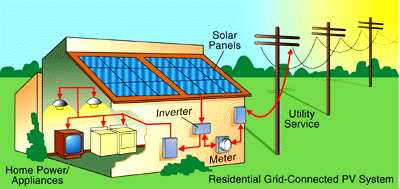1. GOVERNMENT INCENTIVES
Federal, provincial governments offer incentives to encourage homeowners to switch to solar power. The solar incentives vary by province, Ontario government’s current incentive – Feed in tariff pays premium for the solar electricity for 20 year. And the federal government allows solar system owners to get 100% HST rebate and depreciate their solar energy system at 50% rate.
Ontario government’s feed in tariff incentive program set to end in 2017 and replaced by Net metering program. Contrast to Feed in Tariff program, under Net Metering program, whenever the solar system is generating more electricity than you actually can use, the system is designed to send the solar electricity into the grid and you receive a credit for the energy your system is pushing onto the grid.
2. LOWER or ELIMINATE ELECTRICITY BILLS
The most immediate effects solar power system owners will see are no or lower utility bills. Once you hit the point where your solar panels have paid for themselves, its real savings straight to the bank after that. With utility rates climbing regularly, each year you’ll save more with solar than the year before. However, the long-term advantage of solar energy is energy independence. Once the upfront costs for the system are paid, there is no longer a need to worry about the availability or price of energy as long as the system is running – you are the energy provider.
3. INCREASE THE VALUE OF YOUR HOME
Buying a home with solar panels directly translates into additional income or lower electricity costs. Just like homes in preferred school districts or homes with good Home Energy Ratings, solar panels will increase a home’s attractiveness on the market. A study conducted by Lawrence Berkeley Labs in US clearly shows that your home’s value will increase by $4000.00 for every kilo watt of solar powers. The exact numbers vary from property to property and installation to installation, but an average increase in resale value being $4000.00 for each one kilowatt (kW) of solar power installed. The property value advantages of solar energy only increase as you scale up. It’s important to note that these statistics only apply to today’s housing prices and utility rates. As electricity prices go up (as they most certainly will), the advantages of solar energy rise as well.
4. LOW MAINTENANCE AND HIGH RELIABILITY
Modern solar-electric systems are built to withstand normal and seasonal environmental conditions with little to no maintenance. Operating and maintenance (O&M) involves preventative routines mostly defined by inspections, both periodic and after significant events, such as storms. Owners of residential and small scale installations often can perform these inspections themselves. We freely educate our customers on low risk routines. Local conditions, such as winds, dust and birds will determine the frequency. We include monitoring system with each and every solar power system we sell. Monitoring system will help the owner of the system to keep a close eye on the solar power system and take an appropriate action when needed.
5. SECURE PLANET FOR THE FUTURE GENERATIONS
Yes, this is the most important benefit of installing solar panels. While generating electricity solar panels do not create any waste or emissions. Unlike coal or diesel power plants, solar power system produce clean, renewable energy from a fuel source that requires no locating, excavation, transportation, or combustion. Solar power is as reliable as the sun – shining again and again for thousands of years. Last but not least, solar also grants energy independence, since the fuel for solar panels is the sun’s energy and is available everywhere and it is free for everyone.
 The cost of PV keeps has come down substantially. Now, solar can compete with any other form of electrical generation. So, why don’t we just convert to solar based off grid? Off-grid solar is a system designed to help people function without the support of electrical infrastructure – utility’s electrical grid. A true off-grid house is able to operate completely independently of all traditional public utility services.
The cost of PV keeps has come down substantially. Now, solar can compete with any other form of electrical generation. So, why don’t we just convert to solar based off grid? Off-grid solar is a system designed to help people function without the support of electrical infrastructure – utility’s electrical grid. A true off-grid house is able to operate completely independently of all traditional public utility services.






